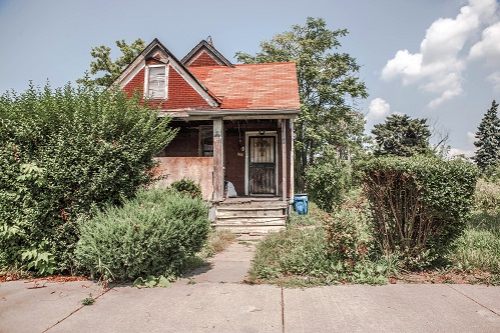- Does credit score affect home insurance?
- Why do insurers care about a person's credit history?
- How does credit history influence home insurance costs?
- When home insurance companies check your credit
- Which states have the highest homeowners insurance rates with bad credit?
- What should you do if you have poor credit?
Does credit score affect home insurance?
Insurance companies often devise a credit-based insurance (CBI) score, which differs from a FICO credit score.
Loretta Worters, vice president of media relations for the Insurance Information Institute (III), says every insurer weighs credit differently when setting homeowners insurance rates.
"Just as insurance scores help insurance companies assess and price risks, so too can these scores help insurance customers -- particularly if they are considered good risks. Depending on the company and state, roughly 50% of policyholders can pay lower premiums because of good credit,” Worters says.
"Insurers also consider your prior insurance loss history, the construction type of your home, the distance of your home from fire hydrants and fire stations and whether or not you have smoke detectors, fire alarms and a security alarm in your home," says Worters.
How much more do people with poor credit pay for their home insurance? On average, a homeowner with bad credit with a $300,000 home policy that has a $1,000 deductible and $300,000 in liability protection pays nearly $2,500 more annually.
Here are the national averages:
| Excellent credit | Bad credit | % difference | $ difference |
|---|---|---|---|
| $1,906 | $4,400 | 131% | $2,494 |
Why do insurers care about a person's credit history?
Insurance companies use credit history to figure out which people might have trouble paying premiums. They also equate poor credit with someone who may be more apt to file claims.
Studies maintain that people who manage their finances well tend to manage other important aspects of their lives responsibly, such as maintaining their home or making routine repairs. Insurance companies like to see this.
"Someone who has over-leveraged themselves (debt-to-income ratio), history of late pays, collections or loans in default is a much bigger risk in the eyes of the insurance companies," says John Espenschied, owner of Insurance Brokers Group. "Someone who has kept low balances and shows a history of on-time payments is viewed as more responsible and a better risk for insurance."
How does credit history influence home insurance costs?
That CBI score is often just referred to as an "insurance score.” As with a FICO score, CBI is a collection of financial factors that determines your overall credit stability, but on the terms of the insurance company. In other words, it’s based on what they care about related to your credit and how it pertains to home insurance. Insurers vary their formulas to determine this.
"Many property and casualty insurance companies find that consumer credit information correlates with future losses," says Kevin Haney, who owns A.S.K. Benefit Solutions and has more than a decade of experience with Experian, one of the "big three" consumer credit reporting agencies. "In other words, the data improves their ability to forecast how prospect and customer segments will behave over time."
Here’s what can positively affect your score:
- Long credit history
- Low credit usage
- Good standing at your banks and credit accounts
- Paying on time
"Insurers look at your financial behavior -- like how frequently you've had late or missed bill payments and how much debt you have -- to generate your credit-based insurance (CBI) score," says Worters.
Policies vary significantly between insurance companies. That includes how often a company checks your credit. Many pull a credit check when you're a new applicant, or when you are renewing a policy. Most carriers also adhere to regulatory requirements, running a check when it’s mandatory. These requirements vary by state, too.
"Every insurance company employs a different risk underwriting strategy for how and when they use credit information," says Haney. "Some may look at your file each time they price policies for new customers and renewals. Others may do so after a claim."
Credit checks also influence rates. It depends on whether it’s a soft or hard pull. A soft pull, such as checking your own credit score, doesn’t affect credit scores. However, applying for a credit card or mortgage is a hard pull. That can hurt your credit score, which is one reason why applying for multiple credit cards in a short period. isn’t wise.
When home insurance companies check your credit
Home insurers usually care about your credit history, but they don’t keep tabs on it. Most companies check your credit score when you first apply or when you renew. Espenschied said some insurers run credit numbers every three to five years. States also have different requirements.
"We've seen companies sometimes take very large rate increases for no particular reason that anyone can explain," says Espenschied. "The problem is no insurance company will reveal the black box they use to determine what credit score equals what premium."
Which states have the highest homeowners insurance rates with bad credit?
Most states allow insurers to base at least part of your home insurance rates on your credit history. In some states, insurers must alert you when your credit history affects your home insurance. For instance, the Fair Credit Reporting Act (FCRA) Adverse Action Notification "requires any user of a credit report to notify the consumer if the use of that report resulted in an adverse action, which, in the case of insurance, would be a denial of coverage or a higher premium than a consumer with an average insurance credit score."
Here are the states that don't allow insurers to use credit or place serious restrictions on their use:
- California and Massachusetts forbid insurers from using credit history when determining insurance rates.
- Maryland doesn’t allow it for home insurance rates.
- Then there’s Florida. The Sunshine State lets insurers partially base rates on credit history. That means you won’t see as much of a rate increase if you have lousy credit in Florida as you would most states.
Insurance companies can’t just set rates on their own. Companies must propose rates and get the OK from each state’s Department of Insurance.
So, which states charge the most for people with poor credit?
Here the averages by state for a $300,000 home policy with a $1,000 deductible and $300,000 liability coverage (we didn’t include California, Maryland and Massachusetts since they don't allow insurers to base home insurance rates on credit history):
| State | Good Credit | Poor Credit | % increase | $ increase |
|---|---|---|---|---|
| Oklahoma | $4,707 | $11,048 | 135% | $6,341 |
| Kansas | $4,865 | $9,290 | 91% | $4,425 |
| North Dakota | $2,259 | $8,820 | 290% | $6,561 |
| Kentucky | $2,639 | $8,505 | 222% | $5,866 |
| Minnesota | $2,529 | $8,213 | 225% | $5,684 |
| Arkansas | $3,529 | $8,197 | 132% | $4,668 |
| Tennessee | $2,998 | $7,555 | 152% | $4,557 |
| Texas | $3,678 | $7,330 | 99% | $3,652 |
| Louisiana | $4,175 | $7,162 | 72% | $2,987 |
| Nebraska | $3,440 | $7,135 | 107% | $3,695 |
| South Dakota | $3,059 | $6,834 | 123% | $3,775 |
| Montana | $2,732 | $6,683 | 145% | $3,951 |
| Michigan | $1,912 | $6,667 | 249% | $4,755 |
| Florida | $6,093 | $6,568 | 8% | $475 |
| Missouri | $2,942 | $6,413 | 118% | $3,471 |
| Iowa | $2,152 | $6,392 | 197% | $4,240 |
| Georgia | $2,061 | $6,268 | 204% | $4,207 |
| Alabama | $3,081 | $6,194 | 101% | $3,113 |
| Mississippi | $3,596 | $6,054 | 68% | $2,458 |
| Colorado | $3,243 | $5,985 | 85% | $2,742 |
| South Carolina | $2,619 | $5,131 | 96% | $2,512 |
| West Virginia | $1,885 | $5,032 | 167% | $3,147 |
| New Mexico | $2,438 | $4,443 | 82% | $2,005 |
| Illinois | $1,900 | $4,302 | 126% | $2,402 |
| Utah | $1,126 | $4,254 | 278% | $3,128 |
| Indiana | $2,057 | $4,205 | 104% | $2,148 |
| Virginia | $1,717 | $4,166 | 143% | $2,449 |
| Ohio | $1,713 | $3,988 | 133% | $2,275 |
| Maine | $1,550 | $3,977 | 157% | $2,427 |
| Wyoming | $1,696 | $3,828 | 126% | $2,132 |
| Arizona | $1,785 | $3,585 | 101% | $1,800 |
| Connecticut | $1,774 | $3,564 | 101% | $1,790 |
| Pennsylvania | $1,238 | $3,414 | 176% | $2,176 |
| Wisconsin | $1,454 | $3,226 | 122% | $1,772 |
| Idaho | $1,463 | $3,202 | 119% | $1,739 |
| North Carolina | $1,957 | $3,182 | 63% | $1,225 |
| Oregon | $1,119 | $3,168 | 183% | $2,049 |
| New York | $1,659 | $3,023 | 82% | $1,364 |
| Rhode Island | $1,891 | $2,824 | 49% | $933 |
| New Jersey | $1,454 | $2,754 | 89% | $1,300 |
| Alaska | $1,482 | $2,744 | 85% | $1,262 |
| New Hampshire | $1,109 | $2,449 | 121% | $1,340 |
| Delaware | $1,219 | $2,362 | 94% | $1,143 |
| Nevada | $1,220 | $2,236 | 83% | $1,016 |
| Washington | $1,288 | $2,149 | 67% | $861 |
| Washington, D.C. | $1,260 | $2,106 | 67% | $846 |
| Vermont | $929 | $2,019 | 117% | $1,090 |
As you can see, rates vary widely by state. Why the difference in rates? There are a few possible reasons:
- The state’s regulations
- The insurer
- The number of claims
A good rule of thumb is that the riskier the area, the more you’ll pay for home insurance. For instance, a home that’s along the coast, which gets hit with powerful storms. An insurer considers that home riskier than property inland that doesn’t get hit as hard.
Insurers also consider the home’s claims and how much you file claims. A previous homeowner who filed claims for everything will mean higher rates -- even though you had nothing to do with it. Insurers view these properties as riskier. The same goes for your neighbors. If your neighbors file many claims, an insurer may hold that against you. It may consider the whole area risky.
What should you do if you have poor credit?
Your credit score is among the most important factors in differentiating rates between homeowners insurance companies, so as with all savvy shopping, you've got to compare and contrast.
"People with poor credit can improve their score and shop around for insurance," says Haney. "They can improve ratings by paying bills on time, reducing debt and disputing errors on their consumer report. They can get multiple homeowners insurance quotes because each issuing company performs underwriting differently. Getting an insurance quote results in a soft inquiry, which does not hurt your credit score."
If your credit isn't so hot, there are ways to improve it. Patience and diligence are key, so take it step by step, and those points can rise. Here are several tips courtesy of III:
- Pay your bills on time.
- If you missed payments, get current and stay current.
- If you’re having trouble making ends meet, contact your creditors or see a legitimate credit counselor.
- Keep balances low on credit cards and other "revolving credit."
- Pay off debt. Don’t just move it around.
- Don't close unused credit cards as a short-term strategy to raise your score.
- Don't open new credit cards that you don't need.
- Open new accounts with due diligence.
- Re-establish your credit history if you have had problems. Opening new accounts responsibly and paying them off on time will raise your score in the long term.
Espenschied echoed that the best advice for those with poor credit, besides shopping around for lower homeowners insurance, is to tackle that debt.
"In most cases, lenders just want to be paid back and are willing to work with you, which means they might not report continual late payments if you can make a solid arrangement,” Espenschied says.







